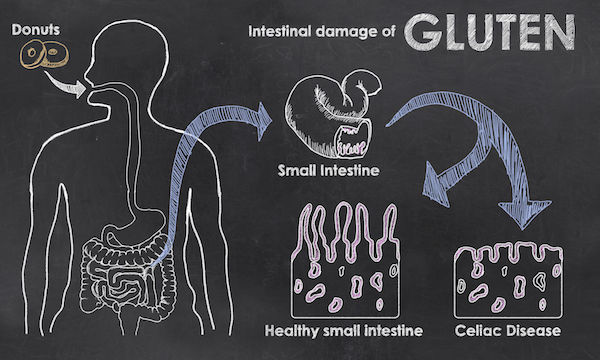Coeliac disease causes the body’s own immune system to release antibodies that attack the lining of the small intestine when foods containing gluten are eaten.

This leads to inflammation and, over time, the destruction and flattening of the villi, which are tiny finger-like protrusions in the small intestine necessary for absorption. As a result, coeliac disease sufferers become malnourished, which can make them susceptible to many other health problems.
Adhering to a strict gluten-free diet, which means cutting out most breads, pastas, cereals and grains, is the only way in which the intestinal lining is able to repair itself.
What are its symptoms?
Coeliac disease symptoms include:
- Diarrhoea (usually with characteristic pale coloured, greasy stools)
- Abdominal pain, cramping, bloating or other gastrointestinal symptoms
- Weight loss
- Fatigue
- Mouth ulcers
- Dermatitis herpetiformis (a type of skin rash)
- Bone or joint pain
- Muscle cramps
- Anaemia and other nutritional deficiencies
It’s important to note that while diarrhoea and weight loss are the most common symptoms, some people experience very few symptoms at all. Even so, long-term malabsorption can lead to serious consequences like reduced bone density and infertility, so even asymptomatic coeliac disease should be treated.
How is it diagnosed?
Several tests may be carried out in order to make a coeliac disease diagnosis. A blood test will look for elevated antibody levels to indicate that the immune system is responding inappropriately to the presence of gluten in the body.
A gastroscopy may also be performed, whereby a tiny camera is passed down the throat to examine the small intestine. A biopsy sample will be collected, then be examined under a microscope for damage to the villi.
Coeliac disease testing should occur before a gluten-free diet is implemented, otherwise this may influence test results.
What are your treatment options?
Coeliac disease does not have a cure. There is no medication for coeliac disease at present.
The only effective coeliac disease treatment is a completely gluten-free diet for life. It’s important that coeliac disease sufferers consult with a dietician to help them develop a well-balanced gluten-free eating plan.
Fortunately gluten-free products are becoming easier to find in regular supermarkets as well as specialist health stores. Avoid any products that list wheat, barley or rye as ingredients. There are many websites and cookbooks that focus on gluten-free cooking, with ideas for delicious meals, gluten-free ingredients to substitute for those containing gluten, and more.
Can it be prevented?
Most cases of coeliac disease have a genetic basis, making some people more predisposed to developing the condition. This means that coeliac disease cannot be prevented.
Some research suggests that people who are exposed to wheat, barley or rye too early in life before the intestinal microflora are fully developed (usually within the first three months of birth) have a higher risk of going on to develop the disease.
IMAGE CREDIT: 123rf.com
